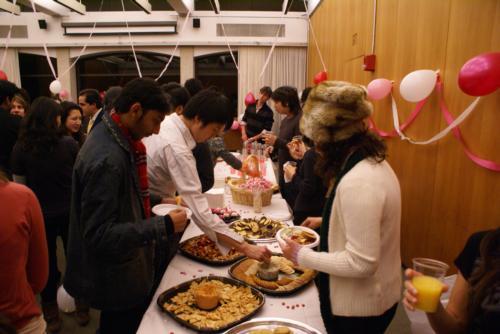Last week, the stereotypical hoards surrounding John Harvard, taking pictures, and ensuring that students bound for the Science Center are late for class weren’t the tourists we’ve all come to expect. Rather than unofficial tour groups illuminating the Yard with strobe-light like flashes, the crowds were made up of the delegates from the Fourth annual Harvard College in Asia Program (HCAP) conference, which took place from Feb. 9 to 17.
Founded in 2003, HCAP began with a lofty goal: to “foster greater interest and understanding of Asia among Harvard students (and of the United States among students in Asia),” according to the student organization’s Web site. HCAP works with partner universities across Asia in pursuit of this goal. This year, HCAP worked with six different Asian Universities: the Indian Institute of Technology, the University of Tokyo, the American University in Dubai, the National University of Singapore, Ewha Woman’s University in Seoul, and Hong Kong University. Each February, HCAP hosts a week long conference at Harvard for Asian exchange students. In return, HCAP members attend week-long conferences at the partner-universities over spring break.
The HCAP experience is unique because it combines academic, cultural and social components. “You’re not just visiting as a tourist,” HCAP member Emily A. Bruemmer ’09 explains. “And when they come here, it’s not just as tourists. There’s an academic component...and then there’s also hanging out and bonding.”
The inclusion of a party component is not altogether surprising, as the entire program is student run. “Everything that’s planned—all the money that we get—is all the result of student efforts,” says Yi Wei ’10, the organization’s spokeswoman. This year’s success goes to show that their efforts paid off both inside and outside the classroom.
THE ACADEMIC SIDE: IT IS A HARVARD PROGRAM, AFTER ALL
The conferences on both sides of the Pacific center on a given academic theme. The 2008 Harvard conference focused on “Building the Future: Urban Planning and Sustainable Development,” according to the HCAP Web site. The conference was packed with thematic events, including a lecture by Professor Charles H. Langmuir, who teaches Science B-35: “How to Build a Habitable Planet,” a trip to New York to meet with the architect of the Freedom Tower at Ground Zero, and a presentation by the Allston Development Group.
The themes and accompanying activities vary year to year and continent to continent: at the 2007 Hong Kong University conference, Bruemmer remembers her delegation’s tour of an import-export company. “It was really incredible, because you never think about where all this stuff...is coming from,” Bruemmer recalls. “We just went through this warehouse, and there were just stacks and stacks of stuff being ready to be shipped all over the world.”
SOCIALIZING AND CULTURAL EXCHANGE
But HCAP is not your typical immersion program. “HCAP stands out for me because it extends beyond the academic exchange that characterizes a lot of the other Harvard exchange programs,” says Wei. “Although it’s only a week long on either end...it’s surprising how lasting the relationships become.”
While HCAP members speak fondly of their academic experiences abroad (museum visits!), it is the social and cultural interactions that stand out in their memories. Bunking up together in the Yard (or River, or Quad) makes for closer bonding, and not just due to the bathroom sharing.
HCAP member Ana M. Franco ’10 hosted two Japanese delegates, and ended up sharing late-night bonding as well as her bed. Despite the early-morning events and lectures, the three girls stayed up chatting late into the night. Wei also partook in after-hours adventures: at a dorm party with a group of Indian delegates, they taught her some Indian dance moves and she showed them how to break it down American-style.
The Asian delegates are also exposed other things new and crazy—and sometimes even natural. Aside from American booty shaking practices, beer pong, and Harvard’s expansion plan, the trip to Cambridge is the first time many delegates have ever seen snow. The Malaysian delegate that Wei hosted last year was ecstatic about the fluffy flakes that many Harvard students so bemoan. “We took her outside and made snow angels,” says Wei.
The students shared traditions unique to Harvard, as well. After explaining primal scream to a Japanese delegate, Wei inspired him to take the custom back to his own campus. The University of Tokyo will never be the same.
THE FUTURE
HCAP’s bottom line, besides learning about another culture (a.k.a. partying), is that the mutual experiences last beyond just a week. Sharing the academic, cultural, and social networks that HCAP creates leads to the formation of long-lasting bonds between delegates.
These friendships suggest that HCAP does more than simply create interest in another culture, as it sets out to do. Seema Amble ’09, who attended Hong Kong University’s conference last year, has kept in touch with the delegates she met via the internet. “In Hong Kong, they are huge fans of Facebook, so they’re all my Facebook friends,” she says.
HCAP provides a uniquely fun and exciting educational experience for everyone involved. “I’ve been to Asia before, but I hadn’t gotten the opportunity to see Asia through someone who lives there, their eyes,” Amble says. “You’re normally a tourist and you do your own thing.”
While HCAP’s application process is already highly competitive, members find it surprising that more people do not apply. “I think HCAP is just one of those gems that haven’t been found out yet by the rest of the Harvard community. If everyone knew about it, it would be chaos,” Wei says.
Let the chaos begin.


